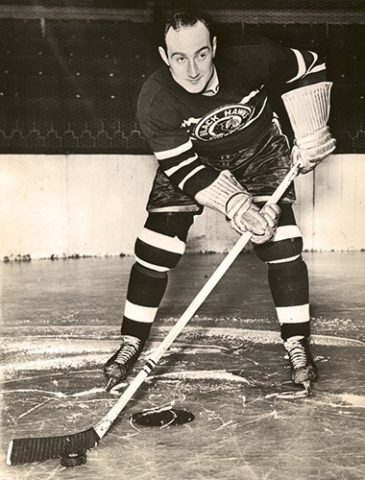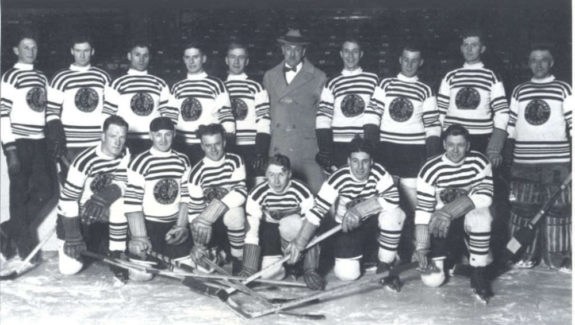Emergency third-string goalie David Ayres stunned the hockey world when he helped the Carolina Hurricanes beat the Toronto Maple Leafs on Feb. 22, 2020. But he wasn’t the first unlikely, fill-in puckstopper to help a team beat the Leafs in Toronto. Another last-minute replacement pulled off a similar feat for the Chicago Black Hawks in the 1938 Stanley Cup Final – and he did it after spending much of the afternoon downing beers at a local watering hole.
The 1937-38 Black Hawks had backed into the playoffs with a pitiful 14-25-9 record. However, that was good enough for third place and the last playoff spot in the American Division, only one point clear of the Detroit Red Wings. The NHL then consisted of two four-team divisions, with the top three in each earning a postseason berth. In the first round, Chicago shocked the Montreal Canadiens when, in the deciding game of the best-of-three series, Earl Seibert tied things up with 1:26 left in the third and left-winger Paul Thompson ended the series with a goal in overtime.
The dark-horse Hawks were gelling at just the right time, as one Montreal reporter noted. “They are a different team from the meek and mild, drab and listless Chicago outfit that visited here throughout the schedule. They have developed into a rough and tumble, fighting crew… The Hawks now have snap and drive, color and power, and, curiously enough, scoring power.” (from “Hawks May Prove to Be the Dark-Horses of Playoffs,” Montreal Gazette, March 28, 1938)
After hitting a speed bump in their next game, a 3-1 loss to the New York Americans in the first game of their best-of-three semi-final series, the resilient Chicagoans rebounded with a stronger performance in Game 2 back in the Windy City. The teams entered a second overtime period tied at goose eggs. In the 13th minute, Chicago’s Cully Dahlstrom, no doubt possessing an extra step in his skates after being named the Calder Trophy winner as top NHL rookie earlier in the day, blistered a seeing-eye shot into the top corner past goalie Earl Robertson to keep the Hawks’ unlikely playoff run alive.

In the deciding game at Madison Square Garden, they sent the packed house home with long faces by dispatching the Amerks with a 3-2 win. The Cinderella Hawks would now, miraculously, play for the Stanley Cup in a best-of-five Final against the Maple Leafs.
Black Hawks’ Starting Goalie Goes Down
Although it wasn’t clear at the time, the team had actually been dealt a major blow in that final game against the Americans. Goalie Mike Karakas — whose standout play had been a major part of their springtime success — had fractured his toe blocking a shot. The severity of the disabled digit wasn’t known until the day of Game 1 against the Leafs in Toronto. In those days, teams did not carry a backup goalie. If the starter went down, a team would have to somehow drum up an able-bodied replacement who happened to be close enough to the rink.
The next-best goalie in the Hawks’ system, rookie Bill Goodman, was in Winnipeg and would never be able to make it for the game. Manager and coach Bill Stewart wanted to bring in Rangers’ starter Dave Kerr, but the Leafs were having none of that. The only other viable option was a local guy named Alfie Moore, who had played for Toronto’s farm team in Pittsburgh that season. Hawks’ star Johnny Gottselig, who knew Moore, was sent out into the city to track him down.
He went to Moore’s house, where his wife told him he was at a nearby tavern. Not finding him there, Gottselig eventually located him at another watering hole. Upon seeing his old friend, Moore said, “By God, am I glad to see you. I’d love to get a couple of tickets for tonight’s game.”
“Boy, Alfie,” Gottselig replied, “you got the best seat in the house.” (from The Stanley Cup, by John Devaney and Burt Goldblatt)
Moore initially balked at the idea, claiming he’d had one too many ales to ever have a hope of playing in any game that night, much less one on hockey’s biggest stage. But after a bit of cajoling by Gottselig, the idea began to grow on Moore. He was keen to prove that Leafs owner-manager Conn Smythe had made a mistake in choosing Turk Broda over him as his number one goalie.
New Chicago Goalie Gets a Sobering Experience
Once at the rink, a few Black Hawks plied their new tender with coffee and gave him a long shower to try to sober him up. Seeing this crazy spectacle incensed coach Stewart, who was resentful of Smythe and his refusal to allow the top-quality Kerr to play for his Hawks. Things came to a head as the teams were taking the ice to start the game when Smythe and Stewart exchanged words and then punches. Police came in to break up the scrap but not before Stewart had suffered some cuts and bruises to his face.
When the puck finally dropped, the Leafs came out storming and put one by Moore before the game was two minutes old. But, with the effects of the day’s imbibing wearing off, Moore settled in nicely and found a groove. “The hot-faced little relief soldier was up and at ‘em every second of the match. Twisting, turning, blocking with hands, body and feet, he was able to baffle every Leaf shot and repulse every charge on his nets for the balance of the show.” (from “Substitute Goalie Steals First Show,” Toronto Star, April 6, 1938)
Gottselig tied things up before the first period was done, helping to spur his team on. They forechecked the Leafs mercilessly and kept them from getting many quality chances on Moore, who stoned Syl Apps and Co. whenever they did break through. Paul Thompson put the Hawks ahead early in the second and Gottselig struck again with an insurance marker in the third to make the final 3-1.

Skating by the Leafs bench, Moore taunted the Leafs: “You were lucky getting that one goal tonight. If these guys had let me have one more beer before they put the pads on me, I’d have shut you out.” (from “From ‘Shangri-La’ to Stanley Cup?” Detroit Free Press, April 2, 1963)
No More Moore for the 1938 Black Hawks
NHL President Frank Calder ruled Moore ineligible for the rest of the series, meaning Paul Goodman, who had not been on skates in three weeks, had to start Game 2. He was no Alfie Moore, giving up five goals as the Leafs cruised to a 5-1 win to tie the series.
With Karakas returning to the crease wearing a special skate to protect his toe, Chicago rebounded in Game 3 back at the Stadium. A Doc Romnes goal with less than five minutes to play stood up as the winner and put the Hawks within one victory of the franchise’s second Stanley Cup.
In Game 4, one of the flukiest goals in Stanley Cup history seemed to indicate it wasn’t going to be the Leafs’ night. With the Hawks nursing a 2-1 lead late in the second period, Chicago center Jack Shill flicked the puck all the way down the ice from his own zone. Toronto goalie Turk Broda came out to play it but misjudged it, allowing the puck to slip between his skates and straight into the open net.
The Hawks added another in the third and ran out the clock on a 4-1 victory, giving them the Stanley Cup and completing what is still the biggest Cinderella story in hockey history. The 1938 Hawks possess by far the worst regular season winning percentage of any Stanley Cup champion (.385). Closest to them are the 1948-49 Leafs, the only other champs to have a sub-.500 regular season record (.475).
A Stanley Cup Celebration Without Lord Stanley
Unfortunately for the Hawks that night, the Stanley Cup was nowhere to be found in the building. Rumours abounded that Smythe had had it shipped to Toronto in anticipation of a certain return date for Game 5 back at Maple Leaf Gardens. They proved untrue, however. The Cup was actually still in Detroit, where it had resided for two years since the Red Wings had won the first of back-to-back titles in 1936. Two days after the final game, Lord Stanley’s mug arrived in a crate at the Hawks’ offices, where Stewart, Romnes and Shill unpacked it and were at last able to savor their gleaming silver prize.
If it wasn’t for the heroics of Moore in Game 1, there’s a good chance the Cup would never have ended up in the Hawks’ hands. The parallels to David Ayres’ experience 82 years later are uncanny: both were called upon at the last minute, both let in an early goal and then settled down, and both were working in the Leafs’ organization – Ayres a rink maintenance man and occasional Zamboni driver for their Toronto Marlies AHL affiliate, and Moore a goalie for their farm team in Pittsburgh.
One difference is that it seems unlikely the 42-year-old Ayres will ever get into another NHL game. Moore managed to play in five more NHL contests, for Detroit and the New York Americans. He lost them all – but he’d always have that night in Toronto.